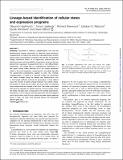Lineage-based identification of cellular states and expression programs
Author(s)
Hashimoto, Tatsunori Benjamin; Jaakkola, Tommi S.; Sherwood, Richard; Mazzoni, Esteban O.; Wichterle, Hynek; Gifford, David K.; ... Show more Show less
DownloadHashimoto-2012-Lineage-based identification of cellular states and expression programs.pdf (734.1Kb)
PUBLISHER_CC
Publisher with Creative Commons License
Creative Commons Attribution
Terms of use
Metadata
Show full item recordAbstract
We present a method, LineageProgram, that uses the developmental lineage relationship of observed gene expression measurements to improve the learning of developmentally relevant cellular states and expression programs. We find that incorporating lineage information allows us to significantly improve both the predictive power and interpretability of expression programs that are derived from expression measurements from in vitro differentiation experiments. The lineage tree of a differentiation experiment is a tree graph whose nodes describe all of the unique expression states in the input expression measurements, and edges describe the experimental perturbations applied to cells. Our method, LineageProgram, is based on a log-linear model with parameters that reflect changes along the lineage tree. Regularization with L1 that based methods controls the parameters in three distinct ways: the number of genes change between two cellular states, the number of unique cellular states, and the number of underlying factors responsible for changes in cell state. The model is estimated with proximal operators to quickly discover a small number of key cell states and gene sets. Comparisons with existing factorization, techniques, such as singular value decomposition and non-negative matrix factorization show that our method provides higher predictive power in held, out tests while inducing sparse and biologically relevant gene sets.
Date issued
2012-01Department
Massachusetts Institute of Technology. Department of Electrical Engineering and Computer ScienceJournal
Bioinformatics
Publisher
Oxford University Press
Citation
Hashimoto, T. et al. “Lineage-based Identification of Cellular States and Expression Programs.” Bioinformatics 28.12 (2012): i250–i257.
Version: Final published version
ISSN
1367-4803
1460-2059